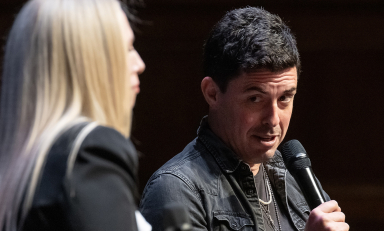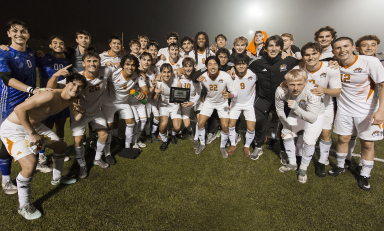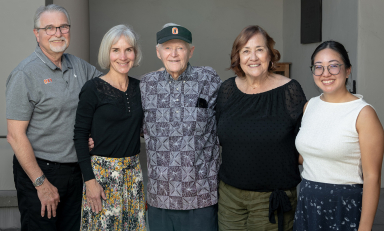What's the story behind Oxy's new department of comparative studies in literature and culture?
In spring 2013, Oxy's English and comparative literary studies department began to narrow its focus to strictly Anglophone literature. (Now it's simply the English department.) The transition led Damian Stocking, associate professor of classical studies and comparative literature, to wonder whether he should follow suit and develop a classics program in Greek and Latin—along the traditional lines of a standalone language major.
But as he discussed the idea with other members of the German, Russian, and classical studies department, they began to brainstorm an entirely different type of program, one that would require students to think across traditional linguistic, literary, and disciplinary boundaries, rather than focus solely on one language, thereby maintaining Oxy's diverse language offerings (which include French, Spanish, Japanese, and Chinese).
"The German, Russian, and classical studies department had no major or unifying principle, so students were rarely able to continue their language study," says Walt Richmond, professor of Russian studies. "By creating an integrated, unified program, we could incorporate more of our skills than we did while operating as separate language programs."
After two years of meetings and proposals, a new, larger, interdisciplinary program, which is open to collaboration with other languages and disciplines throughout the College, became available to Oxy students this fall: the department of comparative studies in literature and culture (CSLC).
"Our fundamental aim is to promote the study of diverse foreign languages at more advanced levels," says Debra Freas, assistant professor of classical studies. "In the past, students could only continue their studies at higher levels through independent study courses. Now, they have a path they can follow to complete a major while studying these languages."
The new major has three principal elements, which ultimately culminate in senior comps. First, students must develop full reading competence within a foreign language tradition by enrolling in three advanced reading-intensive courses.
"A special emphasis is placed on increasing reading comprehension," Richmond says. "Students who are not majoring in CSLC will take a four-unit literature and culture course, based upon the language they are interested in studying, taught in English, while the majors will take a course that combines the English-only course with a session in the target language, using texts in that language."
CSLC majors are then required to develop their theoretical and practical understanding of the interrelations between culture, language, and literature by enrolling in three courses within the department—a methods course with a theoretical emphasis and two translation courses from outside their chosen language fields.
In doing so, students will not only be able to develop full competency in one language, but also learn the fundamentals of another, while comparing and contrasting each language's cultural, linguistic, and literary traditions. "Furthermore, we ask that majors enroll in two thematically related courses from disciplines outside the department, which will complement their language and literature studies," Stocking says.
Through this interdisciplinary pattern of study, students can create personalized majors that reflect their intellectual interests, while using any of Oxy's departments in tandem with CSLC. As a result, they will better understand the ways in which language and culture intertwine with virtually every aspect of society.
With this interdisciplinary approach to learning, the CSLC department houses nearly half of Oxy's foreign languages. And since the department isn't dedicated to one language or region, it can provide students larger intellectual contexts for courses and languages they likely wouldn't have considered otherwise.
"The department's innovations in language and literature pedagogy allow students to draw upon and share in the richness of our courses—between languages and beyond disciplinary borders," Stocking says. "By engaging them with a plurality of cultural and disciplinary perspectives, students partake in a truly holistic liberal arts education that prepares them to become competent, wide-ranging global citizens."
When Will Stupp completes his studies next spring, he will be the first Oxy graduate with a CSLC degree. During a 2013 English class, "Damian pitched his idea for a new department to us during one of his lectures," says the Webster Groves, Mo., senior, who stayed an extra semester in Germany after his study-abroad year. "I had always hoped to continue my study of German anyway, and saw language acquisition as a particularly enlightening part of education. When I came back to the States in August, I signed up [for the CSLC major]. It seemed like everything I wanted from the liberal arts."—Chris Lewis



